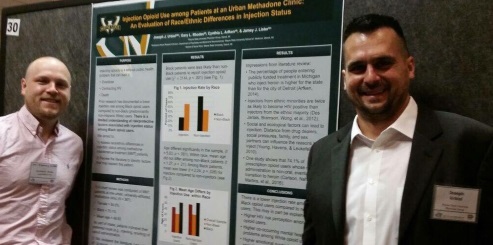Social Work undergraduate receives UROP to study injection opioid use and minority health among African-American patients in methadone treatment

Joseph Urbiel, a student in Wayne State's Bachelor of Social Work program, has received university funding to study factors related to injection status among African-American patients in methadone treatment.
Urbiel (above right) was awarded an Undergraduate Research Opportunities Program (UROP) fellowship for his study, "Injection Opioid Use among Black Patients at an Urban Methadone Clinic: An Evaluation of Risk/Protective Factors to Injection Status." The award provides $2,300 to Urbiel, who works as a peer recovery coach at Wayne State's Tolan Park Research Clinic and will enter his senior year in the fall. Urbiel's faculty mentor, Assistant Social Work Professor Jamey Lister (above left), also receives $750 as part of the award.
For his study, Urbiel will conduct a quantitative study of 100 Black methadone maintenance patients at Tolan Park, which is run by the School of Medicine's (SOM) Department of Psychiatry and Behavioral Neurosciences, to develop an in-depth understanding of factors that led them to inject or prevented them from doing so. In addition to mentoring from Lister, Urbiel will receive guidance and expertise from Professor Cynthia Arfken of SOM's Substance Abuse Research Division and his Tolan Park supervisors Ed Mischel (MSW '79) and psychiatrist Gary Rhodes. This group will assist Urbiel with data collection and analysis.
According to Urbiel, few studies have looked exclusively at Black patients in treatment when compared to the breadth of studies involving heterogenous samples of Whites, Blacks, Hispanics and users of other races and ethnicities. However, the limited data that involves Black opioid users documents a significantly lower injection rate among them when compared to non-Black users. This is important, he says, because further investigation into the reasons for this could yield harm reduction interventions for all users.
"Of course we would like everyone to stop using opioids altogether, but persuading users of heroin not to inject or to stop injecting is a worthy intervention because the risks with injection, namely transmission of HIV and Hepatitis C, are so serious," said Urbiel, who presented on this topic at the University of Alabama-Birmingham's Health Disparities Research Symposium. "For many users of heroin, injecting represents a transition in their use that brings their addiction to a whole new level. Understanding why fewer Blacks inject heroin could lead to new approaches to prevent or stop injection."
Social Work's Lister, who is also an adjunct assistant professor at SOM, is involved in a number of studies involving opioid use disorder treatment with patients at the Tolan Park Research Clinic and other studies involving heroin and opioid abuse among people living in urban and rural settings. Lister said Urbiel's study aims to better understand factors that increase risk or protect people from injecting among "a traditionally underserved group."
"Our study will emphasize core social work content, psychosocial factors and minority health to help understand a major public health problem "" injection drug use "" that crosses all health science disciplines," Lister said.
For additional information on research conducted in the School of Social Work visit the Center for Social Work Research website.